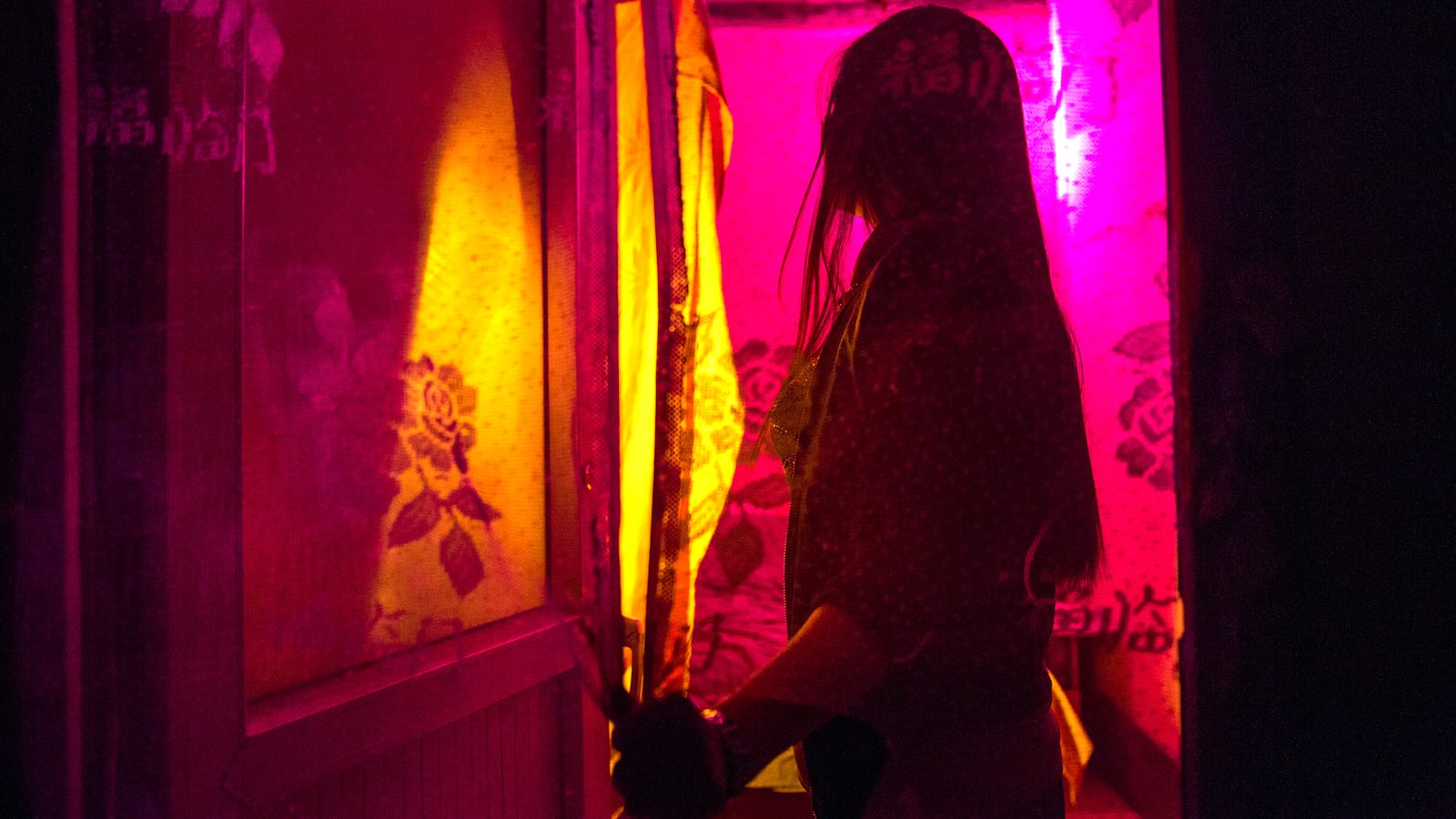HONG KONG—From the outside, the Fuji Building is an unprepossessing facade, no different from thousands of skyscrapers in Hong Kong’s Causeway Bay district. Passers-by could easily remain oblivious to the 18 floors of “one-woman brothels” it houses.
Inside, a line of young to middle-aged men queue for the elevator. My translator and I are the only women around. The bewilderment on the men’s faces increases as we ride to the 22nd floor with them.
The elevator doors open to reveal a hallway spilling over with pink light, mirrored walls, and a thin strand of Christmas lights. Bilingual signs on the door are flipped to say “Please Wait,” “I’m Busy,” “Come in,” or “Available.” One reads, “I’m worth the wait.”
Most doors are decorated with stickers of sexy anime-esque women, some door space is more practically put to use with image-driven lists of what is not allowed in a room: scissors, knives, cameras, backpacks, etc.
Hong Kong is, from time to time, referenced by the lascivious faction of the international online community, as a hotspot for sex—whether via a night out in Lan Kwai Fong, the streets of Yau Ma Tei, or miss148.com. Sites that offer commentary on traveling and living the good life abroad like A Farang Abroad and Dime Travel praise the city as rife with sexual opportunity.
“Hong Kong is a mongering Mecca! Not only do you have whores, but great restaurants, bars, night markets and many sites worth seeing.” These are the words of popular SingleMansParadise.com author who refers to himself as “Brockstar” in his reviews of various cities and countries based on the ease with which one can procure sexual experiences.
The ubiquity of prostitution in Hong Kong is a result of its legality under the rule of “one woman, one room,” meaning there are to be no brothels and no pimps—literally one woman, and one room. There are myriad ways the laws are skirted, from massage establishments with unadvertised services, to bars where honorary female employees have rather fluid roles, to put it lightly.
The conditions that allow this ease of sexual procurement to exist are casually discussed within the forums of sites like Single Man’s Paradise, slighting the underlying concerns voiced by lawmakers and the media regarding the dangers of human trafficking bubbling beneath the surface of the Hong Kong sex scene.
Another area of concern is the enforcement of sex work laws. A 2016 Amnesty International report criticizing Hong Kong law states “police are mandated to reduce or eradicate sex work,” through laws condemning solicitation, “living off the proceeds of prostitution,” and running a “vice establishment.”
The Hong Kong Police Public Relations Duty Officer stands by the enforcement of these laws, stating that “the primary objectives of police enforcement actions are to prevent exploitation of others for the purposes of prostitution, combat organized vice activities, and lessen the nuisance to members of the public that vice activities may cause. The targets of police actions are people who control sex workers for prostitution and keep vice establishments, instead of sex workers, unless the latter are involved in other offenses such as ‘soliciting for an immoral purpose in public places’ or ‘breaching the conditions of stay.’”
These laws may have been conceived of to protect sex workers, but their negative effects have rendered them outdated according to Zi Teng, a prominent Hong Kong rights group for sex workers. “Most of the regulations put sex workers in unstable positions where the law cannot be of service.” For example, having a security guard or partnering with another prostitute could warrant charges of “living off the proceeds of prostitution.”
Regardless of their effectiveness, in locales like the Fuji Building these laws are not irrelevant.
On the 22nd floor a single room is “available.” I ring the silent doorbell; the door opens revealing a young, pale-skinned Chinese woman in a white negligee. Her cloudy contacts match the dreamlike, opaque lighting in the room behind her. The room looks clean and well-mirrored. She speaks Mandarin, not Cantonese. My translator explains that I am a writer and we’d like to ask her a few questions. She shyly smiles, then apologizes, explaining that she does not think her boss would approve.
The floors become progressively less decorative and less busy as we make our way down. The top floors boast the highest number of “new” stickers, which seem to be desirable by their rate of availability. Door after door we are told some apologetic version of “I would like to speak to you, but I don’t think my boss would like it.”
We knock on 15 doors, speaking to 10 women as we descend. On the 10th floor of the Fuji Building, a man in the hallway seems to be paying closer attention than the rest to our attempt to interview a sex worker. As we proceed with our questioning, the short man in a black bandana and cropped muscle T snaps in English, “Hey! What are you doing?”
Unhappy with our explanation, he tells us to leave.
As we head for the stairs he says, “No! You come with me—in here,” irritably motioning to the elevator. In Cantonese, our escort tells the cleaning lady in the elevator to make sure we exit the building. We do.
Zi Teng estimates that there are upwards of 100,000 female sex workers in Hong Kong, most of whom work in “one-woman” brothels or “massage parlors.”
These one-woman brothels have a name in Cantonese that translates to “one room, one phoenix.” The name stems from a famous prostitute nicknamed the Phoenix. The practice is completely legal in theory, yet how often is it a masquerade, a pretext for pimps and mamasans (female pimps) to control a staggering 18 floors of “phoenix women” in ever-bustling Causeway Bay?
The site Wiki Sex Guide, which appears to attract approximately 3 million monthly visitors, describes the Fuji Building as “all legal.” Brockstar of Single Man’s Paradise offers his own distasteful commentary on the building: “In a nutshell, you have over 100 whores in one building and it’s completely LEGAL!”
The South China Morning Post articles about the building have mentioned the occasional arrest of a landlord living off the proceeds of prostitution over the years, but the overall tone is consistent with the set-up’s perceived legality.
Hong Kong historian Jason Wordie has condemned the “hidden in plain sight” situation of human trafficking in Hong Kong and the pervasiveness of exploitation in the Asian megacity. But exploitation is a complex concept.
Lee, a five-year veteran volunteer at Zi Teng, says what is happening in the Fuji Building may not necessarily be exploitation in the obvious sense. Most women who interact with Zi Teng do work for themselves, but many of them would prefer not to be legally obligated to be isolated.
“Some of them want to have partnerships that allow them to increase their safety—being able to share a room, or work with their landlord to have a cctv installed, or to have a male business partner who provides security. The way things are now, these arrangements break the law.”
Lee says that sex workers routinely seem to prefer working with the triads—a Hong Kong crime syndicate, though they are often involved in perfectly legal business operations as well—over the police. “If they are associated with a triad and a customer doesn’t pay them or abuses them in any way, the triad will really do something about it when the police may not, and if they are here illegally, they risk no danger of deportation.”
The police say they are attempting to improve police-sex worker relations by maintaining direct liaison with sex workers via regular visits meant to “enhance exchange of crime information.” They say there are also “regular meetings with sex workers’ concern groups to discuss topics of mutual concern.”
Zi Teng says that despite improvements, the mistrust runs back decades, so the process will take time.
For Zi Teng, as with other groups that advocate for sex worker rights, the ultimate goal is the decriminalization of sex work in Hong Kong. “I don’t know if you can even call it a goal, it’s more like a utopian situation that we hope we can move toward,” says Lee. “If sex work is decriminalized, the stigma against sex workers will likely decrease and they will be able to operate more openly, and more safely.”
The immediate goal is to push lawmakers to write ordinances that more comprehensively lay out the law, stating clear reasoning that remains separated from stigmatizing morality in court. The current laws do not take into account the inherent danger of going at it alone in the industry of sex work.
Sex workers and rights groups like Zi Teng are also advocating for an independent mechanism for reporting police action. “Migrant sex workers incur the highest risk of abuse and robbery, and they often do not report police misconduct or crimes against them out fear of being jailed and deported,” says Lee.
Zi Teng would like support groups to be able to report cases on behalf of individuals. Other social rights groups working with domestic helpers are now pushing for the same thing—nudging the goal toward possible legislation.
The situation is fraught, and there may be no conclusive answer at this point, but what is clear is that the system meant to “safeguard” sex workers is not working.
When sex workers accept the risks of being charged with involvement in a vice establishment, or prefer a relationship with triad members to police officers, there is a blatant need for regulations that will more accurately address the concerns of the so-called phoenix women themselves.
—with translation assistance by Kim Wan





